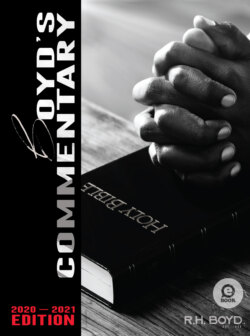Читать книгу Boyd's Commentary - R.H. Boyd Publishing Corporation - Страница 21
На сайте Литреса книга снята с продажи.
EXPOSITION I. FACING PHARAOH (GENESIS 41:25–33)
ОглавлениеJoseph responded to Pharaoh’s request to interpret both of his dreams by explaining the two were one in meaning. God gave Pharaoh two different dreams with the same message to emphasize the importance of the message the dreams conveyed. According to Joseph, they were a forecast of what God was about to do for and in Egypt. In Pharaoh’s first dream, there were two sets of seven cows. The first set was healthy and fat, while the second set was bony and skinny. In his dream, the cows from the second set ate the fat cows from the first and yet were still bony and skinny. Being awakened by the confusion of the dream, he later went back to sleep and dreamed again. The second dream was similar to the first, only it was with grain instead of cows. Seven heads of grain full and plenty were swallowed up by seven ears of withered corn that sprouted later.
Joseph stated the two dreams meant God had decided they would happen soon. This reminds the reader of Joseph’s double dreams at the beginning of the narrative. His dreams would come to pass. All that was left to determine was when and how they would be fulfilled.
According to Joseph, the seven good cows and seven full heads of grain typified seven years of great plenty and economic prosperity that Egypt soon would enjoy. However, this seven-year period of plenty immediately would be followed by seven years of extreme famine, symbolized in the dream by the seven thin and ugly cows and the seven empty heads of grain. The devouring of the fat cows and healthy grain by thin and ugly ones was interpreted by Joseph to mean the seven years of great famine would be so severe the memory of the seven years of great plenty would fade in the despair of their scarcity. According to Genesis 41:30–31, the foreshadowed famine would totally deplete the land of all resources, completely decimating Egypt’s economy.
Our closest corollary would be a recession. The economy comes to a grinding halt and even basic items may be difficult to purchase. For us, unemployment rises and those living on the fringes of society often fall off the proverbial cliff. Even some who were doing well during better times see major upheaval and catastrophe. These moments tend to make us forget better times or at least long for them.
Joseph exceeded the expectations of the king’s initial request when he proceeded to advise him as to what steps should be taken in light of the interpretation. He suggested preventative measures instead of reactionary policy. His proposal to collect one-fifth of the produce of the land during the plentiful years as a reserve for the seven years of famine distinguished him to the pharaoh as the kind of administrator who should lead the nation in coping through this disaster. Though Joseph encouraged the ruler to select someone who was a discerning and wise man who could be trusted to govern over the land of Egypt, he knew within himself that God had positioned him to be that one. It was a kind of backhanded self-promotion and self-deprecation. It worked for Joseph but is not recommended for everyone.
In this way Joseph acted shrewdly. It is likely that in his time in Egypt, Joseph gained a mind for political maneuvering. From Potiphar’s house to the prison, Joseph always was able to position himself well, close to those who were in charge. In truth, this may have been something innate, as he also positioned himself well in his family of origin, next to Jacob. Obviously, given his nature, he was not going to let the opportunity go to waste. Slavery and prison sharpened his tools.
